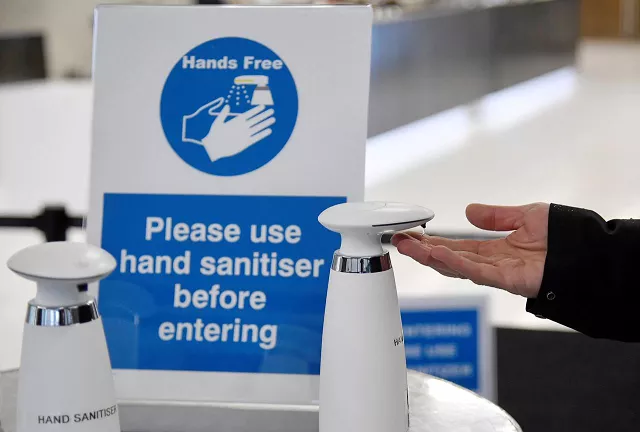Distilleries to ramp up hand-sanitiser production
Govt directs spirit manufacturers to follow WHO’s recommended composition of alcohol-based handrub to ensure efficacy
LAHORE: As the scare of a widespread Covid-19 outbreak led to an acute shortage of disinfectant products across the country, the federal government decided to allow all distilleries to produce hand sanitisers to meet the local demand and prevent further spread of the disease.Per the instructions of the government, distilleries are required to follow the World Health Organisation’s (WHO) recommended composition of alcohol-based handrub for local production, which includes 96 per cent alcohol.
Besides, the government has taken notice of the sale of substandard and unapproved hand sanitisers recently introduced in the market. These products are not helpful to protect people from coronavirus since their alcohol percentage either ranges from 50 to 70, or they contain no alcohol at all.
PM forms 'Tiger Force' to fight coronavirus crisis
Speaking to The Express Tribune, chairman of the Pakistan Ethanol Manufacturers Association (PEMA) Chaudhry Waheed said that many fake hand sanitiser brands have suddenly emerged in the market, most of which do not comply with the WHO production guidelines.
“The sanitisers which are currently being sold in the market are useless and the public is being deceived,” he said. “With the approval of the federal government, all distilleries will manufacture and distribute hand sanitisers in the next five to seven days, which will contain the desired quantity of alcohol to prevent the spread of the novel coronavirus.”
After the outbreak of the Covid-19 disease, the World Health Organisation has described handwashing and the use of hand sanitisers as the most effective ways to protect oneself from the disease. As a result, the demand for hand sanitisers in Pakistan has increased by 500 per cent in less than two months.
Managers of various supermarkets revealed that as imported sanitisers went completely out of stock from the market shelves, many local companies jumped at the opportunity and started supplying substandard and unregistered sanitisers with low or zero alcohol content, that too at inflated prices.
The total number of spirit-producing distilleries in Pakistan is 18 out of which nine major ones are located in Punjab, while seven of them are in Sindh.
Pakistan can produce 82 million litres of spirit annually. However, the industry produces more than 500 million litres each year, out of which 97 per cent of the produce is exported to different countries, fetching $600 to $650 million in foreign exchange for the country. All distilleries have to obtain a license from the excise department to be functional. Additionally, the department also issues L-42-B licenses to various institutions so that they can purchase rectified spirit for medicinal, educational, scientific and industrial use.
To discuss the issue, an important meeting was held last week at the Federal Ministry of Industry and Production in Islamabad, which was attended by both government and PEMA representatives.
Tales of survivors: ‘Never before had I seen doctors dressed up like aliens’
Per the government’s orders, the excise department has now temporarily approved all the applications received for the acquisition of spirit for the purpose of manufacturing hand sanitisiers.
The director-general of the Punjab excise department Sohail Shahzad said that distilleries are required to supply hand sanitisers to governmental departments first, including the Pakistan Army, state-owned hospitals and quarantine centers, before selling it in the market.
In addition, the Punjab government has banned the issuance of export permits to distilleries and manufacturers of hand-sanitisers so that local demand is met on a priority basis.
Published in The Express Tribune, March 31st, 2020.


COMMENTS
Comments are moderated and generally will be posted if they are on-topic and not abusive.
For more information, please see our Comments FAQ